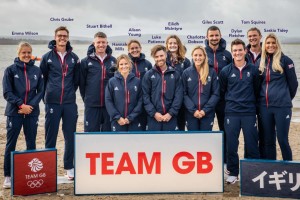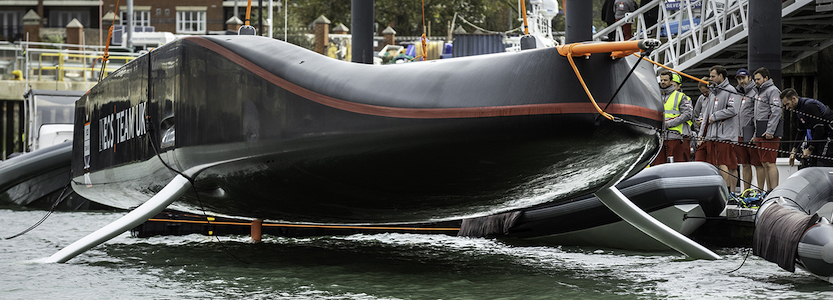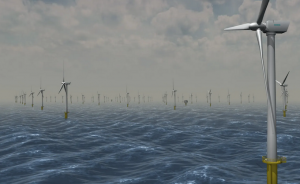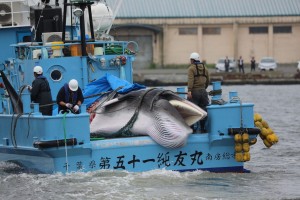• UK America’s Cup challenge Britannia launches
• British Olympic sailing team for Tokyo 2020 announced
• More wind farms
• Moving a 1700s house… by barge
October 4, Portsmouth UK: Sir Ben Ainslie’s INEOS TEAM UK have named their first AC75 boat Britannia (above) for the 36th America’s Cup. She was named by Julia Ratcliffe, daughter of the team’s founder and owner Sir Jim Ratcliffe and the name was inspired by GL Watson’s famous 1893 cutter for the then Prince of Wales, later Edward VII.
The all carbon-fibre Britannia boasts 90,000 design hours and another 50,000 in construction. At 68ft (20.7m) LOA she has a beam of 16ft 5in (5m) and displaces 6,450 tonnes. She has a 6ft 9in (2.06m) bowsprit and a top-speed of 50 knots. This is Sir Ben’s second attempt to win the America’s Cup back for Britain. The cup, originally called the 100 guinea cup, was won by the schooner America racing around the Isle of Wight in 1851. Despite many efforts over the 17 decades since then it has never been won by a British boat. Video from INEOS.
October 2 2019 Cagliari, Sardinia: The third America’s Cup AC75 has hit the water. The Italian Challenger for the 36th America’s Cup AC75 Luna Rossa, built by the Persico Marine boatyard, involved over 90 people in her build, including 37 team designers, and took almost two years to complete, with a total of 78,000 work hours. The boat joins Emirates Team New Zealand and American Magic – Challenger, 36th America’s Cup who are also out foiling in their #AC75‘s. Video from Prada.
 October 1st Team GB reveals its first athletes for Tokyo 2020 Olympic Gold medal sailors Hannah Mills and Giles Scott are part of a 12-strong sailing team named by the British Olympic Association (BOA) as the first Team of GB athletes selected for Tokyo 2020. The 2016 Rio winners were joined by a host of elite sailors representing eight of the 10 Olympic sailing classes, at the announcment at, Rockley Park, in Poole.
October 1st Team GB reveals its first athletes for Tokyo 2020 Olympic Gold medal sailors Hannah Mills and Giles Scott are part of a 12-strong sailing team named by the British Olympic Association (BOA) as the first Team of GB athletes selected for Tokyo 2020. The 2016 Rio winners were joined by a host of elite sailors representing eight of the 10 Olympic sailing classes, at the announcment at, Rockley Park, in Poole.
The 12 sailors are: Giles Scott: Finn (Men’s One Person Dinghy Heavy), Hannah Mills and Eilidh McIntyre: 470 Women (Women’s Two Person Dinghy), Luke Patience and Chris Grube: 470 Men (Men’s Two Person Dinghy), Charlotte Dobson and Saskia Tidey: 49er FX (Women’s Skiff), Dylan Fletcher and Stuart Bithell: 49er (Men’s Skiff), Alison Young: Laser Radial (Women’s One Person Dinghy), Emma Wilson: RS:X Women (Women’s Windsurfer) and Tom Squires: RS:X Men (Men’s Windsurfer).
More here: British Sailing Team Tokyo 2020
Photo by Nick Dempsey – please click to enlarge
October 1st Collossal wind turbines. The General Electric Co has made an agreement to sell its 853-foot (260-meter) Haliade-X turbines for a wind farm off the east coast of England. The turbines – four fifths the height of the Eiffel tower, will each power 16,000 homes. There is evidence they help fish stocks as well. The so-called Dogger Bank wind farm won a power purchase contract from the UK government last month that will support the project, which will have the capacity to generate 3.6 gigawatts of electricity. The wind farms will start working from 2023 to 2025. The news came as the Crown Estate announced eight new areas for leasing to build wind farms, a move which should see the UK producing 30GW of offshore power by 2030 – representing a third of the nation’s power needs.
27 September: Moving house by Barge Incredible video of a 1760s historic brick mansion, The Galloway House, being transported by barge across the Chesapeake Bay from Easton Maryland to its new home in Queenstown Maryland.
September 24, West Ireland: Humpback whales can stay together. Two humpback whales first seen together as a pair off the coast of Cork in Southern Ireland in 1999 have just been spotted off the Blasket Islands of West Kerry. Story from RTE
Meanwhile in Japan a small fleet of ships has restarted commercial whaling, putting whalemeat back on the menu: bbc.co.uk/iplayer/whales-are-back-on-the-menu. The first whales were caught this summer – Japanese fishermen, hunting in Japanese waters are allowed to kill 52 minke, 150 Bryde’s and 25 sei whales – a total of 227 mammals by the end of the year. Luckily this is a far cry from the 1960s when Japan was killing upwards of 20,000 whales each year. Despite a 1986 ban on all commercial whaling, Japan has killed between 200 and 1,200 whales each year since 1987, claiming the practice was purely for scientific research. Needless to say the meat from those whales has most often ended up on sale. Japan and Norway both resigned from the International Whaling Commission earlier this year.
September 20: Alex Thomson launched his latest Vendée Globe challenge boat in London. Alex hopes the £5.5m IMOCA 60 yacht, which has solar panels and an electric motor, will win him the tough solo sailing round the world race which begins on June 16 2020. He finished third in 2013 and came second in 2017 despite damaging a foil.
Full Story here
On September 25, at Monaco, the UN’s Intergovernmental Panel on Climate Change, released its Special Report on the Ocean and Cryosphere in a Changing Climate. The 1,300-page report by 104 authors and editors represents 36 countries and refers to 6,981 publications.
Researchers warned that coastal communities were the most vulnerable to many “climate-related hazards, including tropical cyclones, extreme sea levels and flooding, marine heatwaves, sea ice loss and permafrost thaw.” The agency has already warned that the world is rapidly running out of time to address climate change and keep the planet from warming within 1.5 degrees Celsius above pre-industrial levels. Any warming beyond that benchmark, researchers say, would unleash the worst impacts of the phenomenon. To avoid those threats, the planet would need to aggressively phase out fossil fuels by mid-century and remove carbon dioxide and other gases from the atmosphere from then on. Some dramatic transformations to land management and food production are needed as well. IPCC Report: HERE
September 19: The first Maritime Awards, aimed to celebrate businesses and organisations from the entire spectrum of the sector – from leisure to shipping, professional services to ports and engineering to advanced manufacturing were announced at a ceremony in Soputhampton. Full story here.
September 12: The UK maritime sector aims to be entirely carbon-neutral by 2050. The announcement shows the sector is falling in line with the June announcement by the-then Prime Minister Theresa May, pledging the UK would be producing net zero greenhouse gas emissions by 2050, becoming the first G7 nation to make such a promise. With cruise liners emitting as much particulate matter as a million cars in a day, creating air around them that is as bad as the world’s most polluted cities, it will be a welcome change if and when it happens. More from Sky News: HERE
Send your news to editor@classicsailor.com





